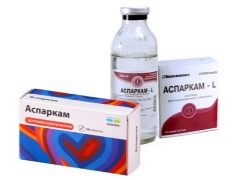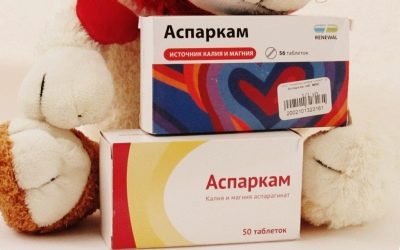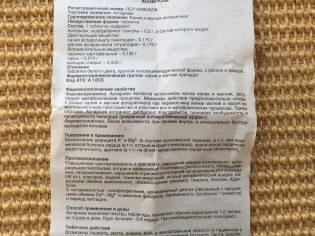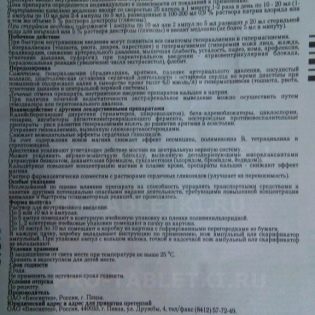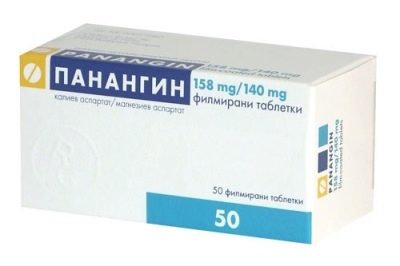"Asparkam" in the treatment of children and its purpose in conjunction with the diuretic "Diakarb"
A drug called "Asparkam" helps eliminate violations, which led to a lack of important substances such as magnesium and potassium. Such a drug is very popular in the practice of cardiologists and is often prescribed to adults for the treatment of heart failure and arrhythmias. But in some cases, it is discharged and children.
Release form and composition
"Asparkam" is produced by many pharmaceutical companies, which is sometimes indicated in the name of the drug ("Asparkam Aveksim", "Asparkam-Farmak", etc.). Most manufacturers offer this medicine in pill form. One pack usually contains 20 or 50 tablets, but there are packages with less or more of them. The drug is sold in blisters or polymer jars.
The tablets themselves are round, white in color, are at risk. They are the source of two active ingredients at once - magnesium asparaginate and potassium asparaginate. The dosage of each of these compounds in one tablet is 175 mg, therefore, on the packaging, it is recorded as “175 mg + 175 mg”. Depending on the manufacturer, there are talc, macrogol, calcium / magnesium stearate, povidone, corn starch and other components among the inactive substances of Asparkam.
Preparations "Asparkam-Pharmak" and "Asparkam-L" are available in injectable form. This is a clear solution poured into 5, 10, or 20 ml ampoules. It does not usually have any color and inclusions, but a yellowish tint is the norm. This drug option is administered intravenously and also contains magnesium and potassium in the form of asparaginates.
Each milliliter of injectable Asparkam gives the patient 40 mg of magnesium asparaginate and 45.2 mg of potassium asparaginate. In addition to these substances, the solution contains sterile water and sorbitol.
Operating principle
Salts of potassium and magnesium in both forms of medicine are of great value to the human body. Without a sufficient amount of them, muscle contraction and metabolic processes in the heart muscle are impossible, and the function of many enzymes may be impaired. Since they are represented by asparaginates, it helps minerals to penetrate the cell membranes, which quickly compensates for the lack of such ions.
The presence in Asparkam of not only potassium, but also magnesium salts is due to the fact that the deficiency of these elements is often observed at the same time. In addition, the drug is in demand for various heart diseases, as it can reduce the toxic effects of heart drugs, called glycosides. At the same time, the therapeutic effect of such medicines under the influence of Asparkam does not decrease.
Indications
Most often, “Asparkam” is resorted to in the treatment of heart rhythm disturbances, heart failure and other problems with the cardiovascular system. In addition, this medicine is in demand when there is a shortage of potassium and magnesium caused by various factors, such as poor nutrition or absorption in the intestines.
Contraindications
Asparks are forbidden in case of hypersensitivity to its components, as well as in metabolic acidosis or dehydration. In addition, the drug can not be used for renal failure and with a high content of potassium in the blood. For heart problems, the medication is not used if the ECG showed an AV block.
Although the instructions for some pills are marked up to 18 years old, the doctor may prescribe such a drug at any age, even a newborn, if there are grounds for this.
Side effects
When using Asparkam, liquid stools, thirst, stomach discomfort, vomiting and other ailments can appear. If these negative symptoms occur, you should immediately tell the doctor about them so that he can prescribe another treatment.
Instructions for use
"Asparkam" tablets taken after meals. The drug is swallowed and washed down with water, and when used in babies (for example, in infants), it is permissible to divide it into parts, after which it is ground into powder and given in a water-diluted form as a suspension.
An injection "Asparkam" is injected into the vein either in a jet or through an IV line after mixing with glucose or another solution for infusion.
The dosage and regimen of the drug for each child is determined by the doctor, because it affects the disease, and the age of the baby, and some other factors.
If "Asparkam" was prescribed for any pathology, it is used in one dose, and for prophylaxis it is necessary to give it in completely different dosages.
The duration of treatment with Asparkam is also influenced by the condition of the child and his diagnosis. The tool can be used in small courses of 3-4 weeks, and for a longer time.
Overdose
Excess dosages of Asparkam can lead to bradycardia, muscle weakness, lower blood pressure, paresthesia, fatigue, the urge to vomit, and other symptoms that occur when the potassium or magnesium concentration is too high in the blood. Calcium chloride and symptomatic agents are used to eliminate them.
Drug interaction
With "Diakarbom"
"Asparkam" is often used in combination with "Diakarb" to eliminate the side effects of this diuretic (reducing the level of potassium in the blood). This combination of drugs is in demand in neurology and is prescribed for the treatment of hydrocephalus, epilepsy, edema, increased intracranial pressure, glaucoma, or concussion of the brain.
Incompatibility
As for incompatibility, treatment with Asparkam should not be combined with the use of astringents, anesthetic drugs, beta-blockers, nonsteroid painkillers and some other medicines. All groups of drugs, the use of which may affect the action of "Asparkam" and the patient's condition, are indicated in the abstract.
Terms of sale and storage
Tablets Asparkam is an over-the-counter medicine, and an injectable drug can be bought only as prescribed by a doctor. The price of the drug depends on the manufacturer, but is low. For a package of 50-56 tablets you need to pay about 40-60 rubles, and 10 ampoules of "Asparkam-L" 5 ml each cost about 50 rubles.
Store both forms of medicine at home in a dry place. The recommended storage temperature is 10-25 degrees. The expiration date of the solution for injections is 2 years, and tablets - 3 years (sometimes 4).
Reviews
On the treatment of "Asparkam" can be found mainly positive feedback. Doctors consider it an effective drug for a lack of potassium or magnesium, and also note its beneficial effect in heart diseases. Parents confirm that this medicine helped to get rid of convulsions, tachycardias and arrhythmias, which led to an improvement in the functioning of the heart and well-being of the child.
Among the minuses of the drug, the presence of contraindications and uncomfortable for children age dosage form (no syrups and suspensions). At the same time, the tolerability of the drug is assessed as good, since side effects are rarely seen. Affordable price and availability in most pharmacies are also referred to as Asparkam benefits.
Analogs
The most popular analogue of "Asparkam" can be called "Panangin", because this drug also contains magnesium and potassium asparaginates, is produced in the same forms and is used for the same indications, but it costs a little more.Instead, the doctor may also prescribe other drugs, given the reason for the appointment of "Asparkam", for example, multivitamins, which contain an adequate dose of potassium and magnesium.
More information about the drug "Asparkam", see the following video.
